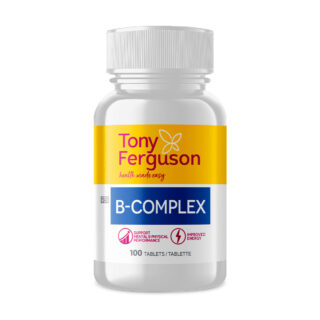Curious about Vitamin B complex benefits? Here’s how this group of essential nutrients can support your energy, focus, and overall wellbeing.
Vitamin B Complex is often suggested as a daily go-to for its wide-ranging role in supporting everyday health. Comprising eight essential B vitamins, this group of nutrients plays a vital role in numerous functions throughout the body — from energy metabolism to nervous system function. Here’s what you need to know.
What Is Vitamin B Complex?
Vitamin B Complex is the collective name for eight essential B vitamins, each playing a unique role in the body. Together, they help convert food into energy, maintain healthy cognitive function, and support immune health, among other important tasks.
Here’s a breakdown of each B vitamin and its recognised functions:
- B1 (Thiamine) – Contributes to normal energy-yielding metabolism, heart function, and functioning of the nervous system¹.
- B2 (Riboflavin) – Supports energy production, helps maintain normal vision and skin, and protects cells from oxidative stress¹.
- B3 (Niacin) – Contributes to normal psychological function, supports the nervous system, helps reduce tiredness and fatigue, and maintains healthy skin and mucous membranes¹.
- B5 (Pantothenic Acid) – Contributes to normal mental performance, the synthesis of steroid hormones, vitamin D, and neurotransmitters, and helps reduce fatigue¹.
- B6 (Pyridoxine) – Supports the normal functioning of the immune system, contributes to the regulation of hormonal activity, and plays a role in red blood cell formation and nervous system health¹.
- B7 (Biotin) – Contributes to the maintenance of normal skin, hair and mucous membranes, supports energy metabolism and the nervous system¹.
- B9 (Folate / Folic Acid) – Crucial for normal blood formation, supports maternal tissue growth during pregnancy, and helps reduce tiredness and fatigue¹.
- B12 (Cobalamin) – Supports normal red blood cell formation, neurological function, energy-yielding metabolism, and contributes to the reduction of fatigue¹.
Potential Benefits of Vitamin B Complex
- Supports Energy-Yielding Metabolism – All B vitamins play a part in converting food into usable energy. If you’re feeling low in energy, B vitamins may help support your body’s natural energy production processes¹ ².
- Supports Psychological and Cognitive Function – Vitamins B1, B3, B6, B9, and B12 all contribute to normal psychological function, making Vitamin B Complex a supportive option during mentally demanding times¹ ³.
- Promotes Healthy Skin, Hair, and Nails – Biotin (B7), Niacin (B3), and Riboflavin (B2) all contribute to the maintenance of normal skin, while Biotin supports healthy hair — a popular benefit in many beauty-support formulas¹.
- Contributes to a Healthy Immune System – Vitamin B6 and B12 are important for the normal function of the immune system, particularly when the body is under stress or strain¹.
- Supports Red Blood Cell Formation – Vitamins B6, B9, and B12 contribute to the normal formation of red blood cells, helping to transport oxygen efficiently throughout the body¹ ⁴.
Who Might Benefit from a B Complex Supplement?
While a healthy, balanced diet provides many of these nutrients, a supplement may be beneficial for:
- Individuals with restrictive diets, especially vegetarians and vegans (B12 is mostly found in animal products)
- Those with high stress levels or demanding lifestyles
- People experiencing fatigue or low energy
- Women who are pregnant or trying to conceive (Folic Acid is essential during pregnancy)
- Older adults, who may have difficulty absorbing certain B vitamins
Vitamin B Complex is a well-rounded way to support your daily wellness — from energy and focus to skin health and immune function. If you’re thinking about including it in your supplement routine, it’s always a good idea to check in with a healthcare provider, especially if you have underlying conditions or take medications.
References:
- European Commission (EU Register of Nutrition and Health Claims) https://ec.europa.eu/food/safety/labelling_nutrition/claims/register/public/
- National Institutes of Health (NIH) Office of Dietary Supplements – B Vitamins https://ods.od.nih.gov/factsheets/list-VitaminsMinerals/
- Kennedy, D. O. (2016). B Vitamins and the Brain: Mechanisms, Dose and Efficacy—A Review. Nutrients, 8(2), 68. https://doi.org/10.3390/nu8020068
- O’Leary, F., & Samman, S. (2010). Vitamin B12 in health and disease. Nutrients, 2(3), 299–316. https://doi.org/10.3390/nu2030299
B Complex - 100 Tabs
R53.99 (incl vat)Add to cart




You will need to sign in before you can post a review for this recipe...
Sign In